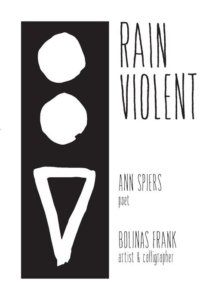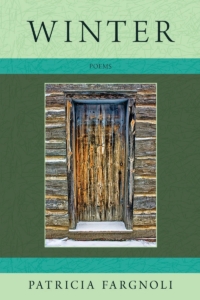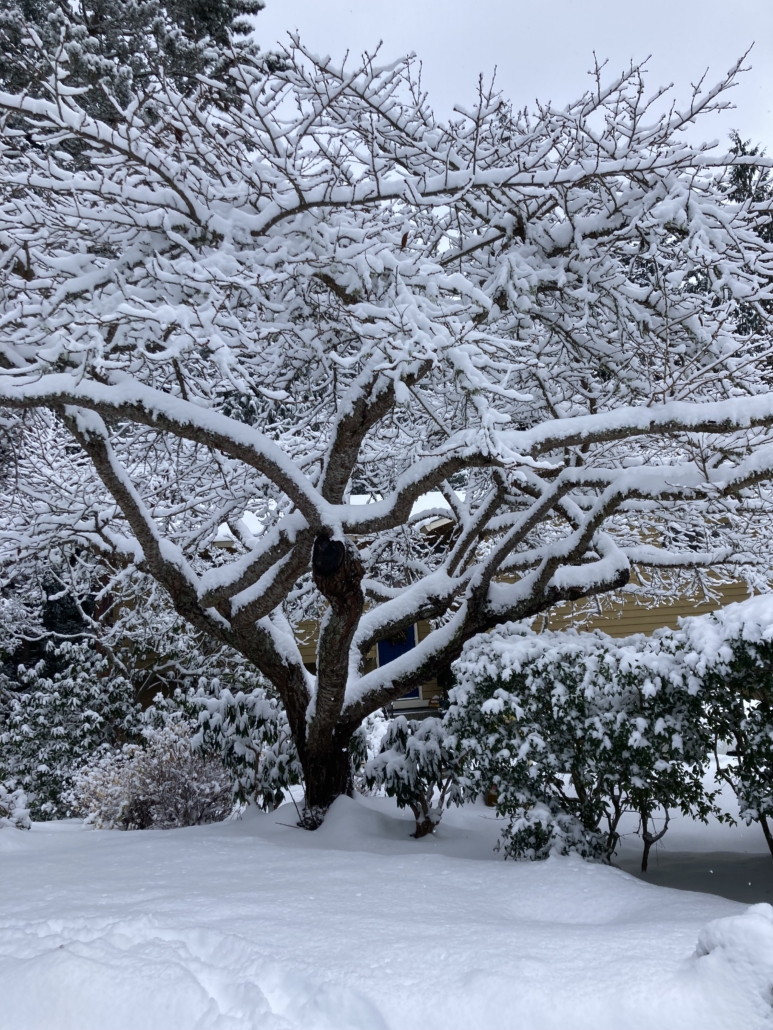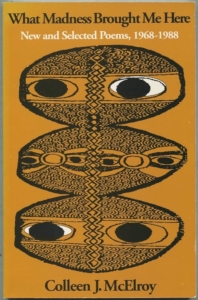Event Cancelled
Just a quick note to let you know my reading at Maplewood Presbyterian in Edmonds tomorrow (1.21.24) has been cancelled. Both my husband and I have the flu.
I’ll let you know when it is rescheduled.
Just a quick note to let you know my reading at Maplewood Presbyterian in Edmonds tomorrow (1.21.24) has been cancelled. Both my husband and I have the flu.
I’ll let you know when it is rescheduled.
RAIN VIOLENT, Ann Spiers (poet), Bolinas Frank (artist & calligrapher). Empty Bowl, 14172 Madrona Drive, Anacortes WA 98223, 2021, 78 pages, $16, paper, www.emptybowl.org.
“In Rain Violent, Ann Spiers unfurls the ravages of climate change,” so Deborah Bacharach begins her Compulsive Reader review of this arresting book. Along the way, Spiers unfurls her own life: a child’s knees, dead bees, Dakota,  chickens, China.
chickens, China.
In his Raven Chronicle review / interview / potpourri of and about this book, Jim Bodeen describes the 61 short poems in Rain Violent as “compulsive” and interpretive of not only weather but of our lives. “We’re in this weather together, reader.” He talks with both Spiers and Bolinas Frank, whose hand-painted weather symbols illustrate and accentuate each title (please skip over there and take a look at all he has to say).
Do take note of the cover designed by Tonya Namura.
My own weather today (Rain Continuous: three black dots arranged in a loose triangle):
Rain Continuous
I wear rain gear always.
Some of us go naked, cycling
through the market. Everyone wears
shower caps, crinkling over coiled hair.—Ann Spiers
The poems are 4-lines each, not much room to play in, you would think—though every line bears Spiers’ signature sound-play, “Electronic hearts skitter. / Data, like confused fighter jets, scramble” (“Wind Out of the North”); “Snake skins, shunting in the wind like riffs / from a broken guitar” (“Thunder Heard”).
The prose introducing and following the poems also drew me in. I love Spier’s biographical note, a Vashon Island, Washington, poet I have reviewed before, but should know better. And we get this from the bio note on artist and calligrapher Bolinas Frank, suggesting the depth and range of the symbols, not to mention the themes packed into this slim book:
Bolinas sees the painting surface as a skin, and his creation emerges on the intelligent edge where art and life interface. Through his painting’s stacked messages, he asks what is underneath things, what is on the hidden side, what secrets lie underneath, and what information asserts itself….His work speaks about migration, domesticity, atrophy, exposing underlying flaws and defects that are carried, delivered, and exposed. (p. 77)
Rain Violent is a fast read, only 244 lines of poetry, after all. But the format and the content work together to slow you down. I found myself pondering each page. Despite the one-poem per page, and the artful titles and international weather symbols as rendered (beautifully, starkly) by Frank, there’s also a sense of the book as one long poem. When I finished I went back and read it again.
I often feel an urge to leave you with something gorgeous. Instead, this:
Clouds Dissolving
Faucets dry. Streams silent. Pools
fill with brush. I spit on my finger tips
to wash black oil from my child’s knees.
From the air drop dead birds.—Ann Spiers
You can read more about both Spiers and Frank by following these links to their websites:
WINTER, Patricia Fargnoli. Hobblebush Books, Brookline, NH, 2013, 88 pages, $18, paper, https://www.hobblebush.com.
When MoonPath’s Lana Hechtman Ayres told me Patricia Fargnoli had been her teacher and mentor, I went looking  for her. Winter, the sixth volume in the Hobblebush Granite State Poetry Series, was the first to arrive, and is now on sale for $9 at Hobblebush Books (use this link: https://www.hobblebush.com/product-page/winter).
for her. Winter, the sixth volume in the Hobblebush Granite State Poetry Series, was the first to arrive, and is now on sale for $9 at Hobblebush Books (use this link: https://www.hobblebush.com/product-page/winter).
I have fallen hard for this book, and this poet. In “The Horse,” she begins:
I let the horse into my apartment,
pushed back chairs,
shoved the rattan chest
up against the tall bookcases…
Horses abound in this book. What’s not to love?
In addition to any other praise I might dish out, it’s a perfect book to read on a cold and rainy January day. Yes, New Hampshire, snow, but it works its spell here in the Pacific Northwest, too: “[I] found a sad music in the fork of an ash tree, / a music made of wind and the tuning forks of stars” (“Glosa”). As Meg Kearney tells us on the back cover, Fargnoli has “listened deeply to the silence of winter.”
Many of the poems in Winter are about dreams. A line from “Beginning of Winter—A Sijo Sequence”: “Last night in the dream I was hungry, but there was no food.” Or the ending of “Letter to my Double”:
Your dreams tell you what you want:
a man’s arms around your body, a safe place near water,
a bus that arrives on time to carry you home.
She captures the mundane, that daily seemingly ordinary life that we all find ourselves up against, while lifting it above the ordinary. Home, here, is not just the physical place where you lie down at night. The following poem, too, is about an actual place (Ireland, which made me choose it), but it transports us into a dreamscape:
Galway
after Tranströmer’s “Track”
Thousands of crows flew through the Irish dusk
toward the copse of dark plane trees not far from here,
between the university and the famous river,as when memories wing in from your past
with their loud continuous cawing
and then move beyond you, you don’t know where.Or as when someone dies and her spirit rises
to join the others who are leaving the world’s sadness
to find a resting place in the quiet night branches beyond you.The crows streamed past the high clerestory windows.
Dusk. The small wood they entered. The silver river.—Patricia Fargnoli (from Winter)
Notice how the crows are actual, but spur memories that “wing in from your past / with their loud continuous cawing.” Sorry, but I just want to gush on and on. I’ve been thinking (a lot) about how one gets the evanescent, the transcendent into one’s poems, and Fargnoli offers a master class.
When I was working on The Pear Tree, I often thought of something Priscilla Long says in her chapter, “Art and Elegy,” in Dancing with the Muse in Old Age:
“Is it too obvious to say that one advantage of growing old is to remain alive to the beauty and suffering of the world? To make an elegy is to express that beauty and that suffering.” —Priscilla Long
The elegy, the courage to elegize, is a strength of Fargnoli’s Winter.
To learn more about Patricia Fargnoli, visit her page at Hobblebush Books (“Read Sample” offers a PDF of the opening pages of Winter, including the informative table of contents and the first few poems). When I Googled her name I found several video recordings of “Winter’s Grace,” perhaps her best-known poem (which you can also find at https://www.writersalmanac.org/index.html%3Fp=11037.html). Simply gorgeous.

WHAT MADNESS BROUGHT ME HERE: NEW AND SELECTED POEMS, 1968-1988, Colleen J. McElroy. Wesleyan University Press, Hanover and London, 1990, 107 pages. Out of Print.
I had this mad idea that I would—instead of doing my usual blogfest of poetry book reviews in April (National Poetry Month)—review a book each week this year.
The problem being that there is no time this week to sit quietly reading a book of poems, save my own. (In-person launch Thursday, 4 January, Edmonds Bookshop, 6 p.m. For a review of my book, visit Debra Elisa’s blog: https://www.l-i-t.org/read-bethany-reids-latest-poetry-collection-the-pear-tree-elegy-for-a-farm/).
Then it occurred to me that there is no better time to share a poem from my MFA advisor and mentor, Colleen J.  McElroy, who died in December. I have almost all 16 of her books, most of them signed by her. I considered her a friend, as well, and am ashamed that I hadn’t seen her since before 2020.
McElroy, who died in December. I have almost all 16 of her books, most of them signed by her. I considered her a friend, as well, and am ashamed that I hadn’t seen her since before 2020.
A great soul with a voracious appetite for travel, music, and language, she touched innumerable lives, and I am lucky to count myself among them.
I won’t pretend this is a review, just an appreciation.
Looking into the Eyes
finally is Gabriel Garcia Marquez’s feet
this falling in love with book jacked photos
how writers hide everything
in metaphors of frowns as if contemplating
the separation of sky and ground
details that go unnoticed on crowded streets
are embellished by profiles etched
in the ebony and ivory
of chiaroscuro mystery
the way the head tilts determines
whether you will buy the bookyou check poems against the slant
of nose and curl of lip as if
symbols unravel there hollowed
in the corner of the left eye as if
the chapter will somehow gain meaning
once that small scar beside the right
ear is properly highlighted and put
into proper perspectivebackgrounds are filled with allusions
like images drawn from a sixteen-year-
old’s dreams of how poets dream
look into the eyes
home is always some lonely country
or some lover’s promise to return soon
features converge into anthologies
of lines until finally it is no longer
the face but the luscious curve of ankle
the arched toe the little one turned
inward coyly hiding some sweet secret—Colleen J. McElroy (this poem originally published in Lie and Say You Love Me, Circinatum Press, 1981)
To see more poems, visit Poetry Foundation. You can learn more about Professor McElroy at this article in The Seattle Times, or visit Historylink.org, Washington State’s on-line encyclopedia, to read my 2012 biography of her (now updated).

